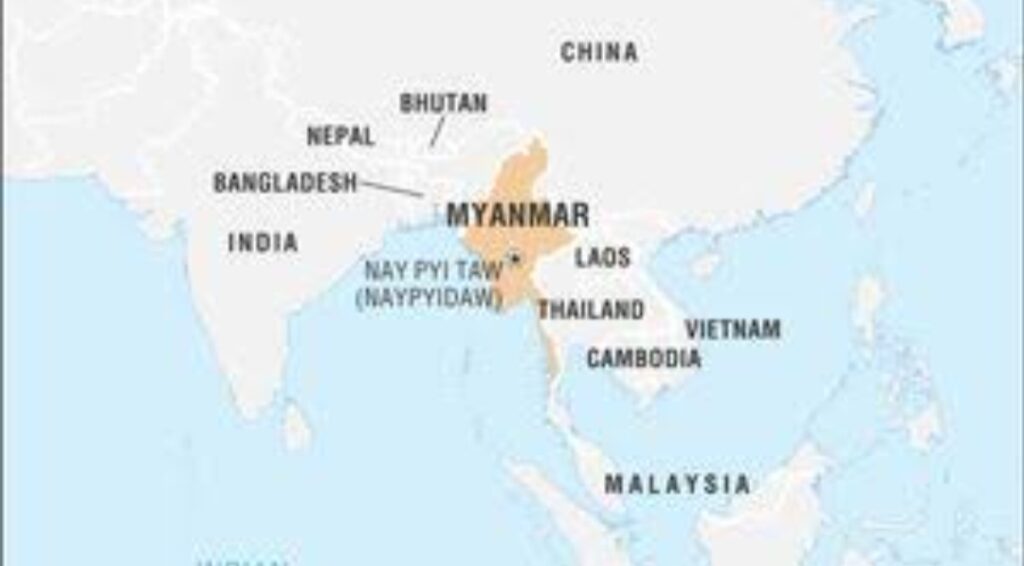By: Niranjan Marjani

India’s Foreign Secretary Vinay Kwatra visited Myanmar on November 20-21, 2022. During his visit he held talks with the senior leadership of Myanmar. The talks centered on issues such as security in border areas and human trafficking. Kwatra’s visit highlights India’s continued policy of engaging with Myanmar. Prior to Kwatra, Harsh Vardhan Shringla, former foreign secretary has visited Myanmar in December 2021.
The military coup in Myanmar in February 2021 has attracted strong reactions from the western countries. The United States (US), the European Union (EU), the United Kingdom (UK) and Australia have imposed sanctions on Myanmar following the coup.
For its part, India has adopted a balanced approach to the crisis in Myanmar and avoided responding in a knee-jerk manner. India has called for restoration of democracy in Myanmar. But India has also continued interacting with the ruling dispensation in Myanmar, the military, known as Sit-Tat (earlier called the Tatmadaw).
India’s policy towards Myanmar needs to be considered from two perspectives – one is concerns about national security and two, how continued interactions with Myanmar have bearing on India’s international engagements.
Concerns about national security
National security remains the principal driving factor in India’s engagements with Myanmar. Bordering India’s Northeast region, stability in Myanmar is crucial to peace and stability in India’s Northeastern states which share kinship ties across the border. The insurgency-prone Northeastern region had also remained underdeveloped for several decades since independence.
However, in recent years, the central government has sought to prioritize development of the region. In part this is being linked to India’s Act East Policy. India is addressing the issue of connectivity of the Northeast region through Kaladan Multi-Modal Transit Transport Project and India-Myanmar-Thailand Trilateral Highway.
These projects are important for India’s connectivity with Southeast Asia as well as for development of India’s Northeastern region. At the recent ASEAN-India Summit in Cambodia in November both the sides reiterated their commitment to link India’s Northeast with Southeast Asia. For its part India is proactively pushing for enhancing the infrastructure in the Northeast. Recently, the central government announced projects worth Rs. 1.6 lakh crores (around $20 billion) for the Northeast. Indian Railways completed survey of laying railway lines in Manipur’s Moreh up to the Myanmar border in November. The acceleration in developmental projects is also complemented by reduction of insurgency. According to a report by Ministry of Home Affairs, the year 2021 saw 74% reduction in insurgency incidents in Northeast.
In this backdrop, it is pertinent for India to engage with Myanmar as security of Northeast depends to a great extent on stable Myanmar and cooperation from Myanmar’s ruling dispensation. The coup in Myanmar has resulted in influx of Chin refugees in Manipur. Chin people share kinship ties with Kuki ethnic tribe of Manipur. This influx has caused ethnic tensions in Manipur where Meitis and Nagas are resenting the growing number of Kuki-Chins which is considered to contribute to ethnic imbalance in the state.
Besides, Myanmar rebels are using Mizoram as a base to arrange and transport arms and equipment to aid their fight against the military junta. Also Northeastern states such as Assam, Mizoram and Tripura are witnessing increasing incidents of drug-trafficking from Myanmar.
These are shared security concerns that affect both India and Myanmar. With due regard to insistence on democratic process, the security factor makes it imperative for India to work closely with Myanmar.
Bearing on India’s international engagements
While the western countries swiftly put limits to their interactions with Myanmar and even imposed punitive measures such as sanctions in the wake of the military coup, India has taken a cautious approach. India has sought to balance the promotion of democratic values with protecting national interests. India’s stand towards Myanmar is concomitant with its stand on various international crises, notably on the Russia-Ukraine war. As the Russia-Ukraine war has had a polarizing effect on the global order, India has trodden a balanced path.
India’s balanced stand on Myanmar has been overshadowed due to intense scrutiny of India’s role with regard to the Russia-Ukraine war. However, Myanmar warrants equal attention as well as an expedited solution to the ongoing crisis.
The sanctions and restrictions on engagements are pushing Myanmar towards international isolation. In turn the isolation has facilitated only Myanmar to increase proximity with China and Russia. Countering China is a common strategic objective of India and the western countries. However, the West’s approach towards Myanmar has increased China’s influence in India’s neighbourhood. Myanmar could turn into a Gordian Knot in India’s future engagements with the western countries.
Similarly, Myanmar could cast a shadow on the India-ASEAN relations. It is pertinent to note that at the recent ASEAN-India Commemorative Summit held in Phnom Penh, Cambodia in November both the sides elevated their ties to Comprehensive Strategic Partnership. India’s latest engagement with Myanmar comes just days after the ASEAN blocked the participation of Myanmar’s military junta chief. The exclusion was justified by the ASEAN as expression of disappointment over continuing violence in Myanmar.
Convergence between India and ASEAN is crucial to realize the vision of rules-based order and a free and open Indo-Pacific. Both India and ASEAN need to find a way to resolve their divergent stands on Myanmar. India’s engagements with Myanmar are not only driven by narrow national security interests. Since the military coup, China has accelerated its engagements with Myanmar by way of investments. Through China-Myanmar Economic Corridor, China is seeking a backdoor entry in the Indian Ocean. During the recent summit in Cambodia, ASEAN had denounced China’s strategic assertion in South China Sea and had called for upholding the need to follow the United Nations Convention for Law of the Seas (UNCLOS). However indifferent stand on Myanmar by the ASEAN could further boost China’s presence in the region thereby presenting a strategic concern for ASEAN and India.
India’s engagements with Myanmar are clearly driven by security concerns. However, the democratic countries maintaining distance from Myanmar need to revisit their policy in order to protect their stakes in the Indo-Pacific Region. In this regard India’s role could assume importance as a power that has engagements with Myanmar as well as with its adversaries.

About the Author
Niranjan Marjani is a Political Analyst based in Vadodara, India. He tweets at @NiranjanMarjani. The views expressed are personal.


Hi there to all, for the reason that I am genuinely keen of reading this website’s post to be updated on a regular basis. It carries pleasant stuff.
Thanks for sharing. I read many of your blog posts, cool, your blog is very good.
Thank you for your sharing. I am worried that I lack creative ideas. It is your article that makes me full of hope. Thank you. But, I have a question, can you help me?